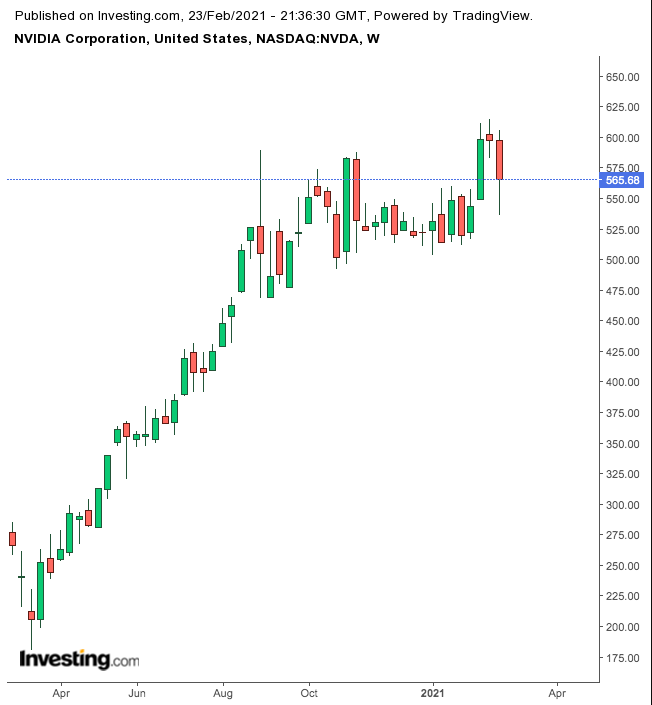UnitedHealth tests AI system to streamline medical claims processing - Bloomberg
- Reports Q4 2021 results on Wednesday, Feb. 24, after the close
- Revenue expectation: $4.82 billion
- EPS expectation: $2.8
When NVIDIA Corp. (NASDAQ:NVDA), one of the largest U.S. chip-makers, reports its latest earnings, it has to address a major concern: How will it handle the supply shortages that have begun to affect its customers and sales growth?
The industry-wide chip shortage has caused prices to rise for some products, while creating delays in filling orders for others. Auto-makers are the most affected, as the acute supply of chips they use in their vehicles have forced some to idle their factories.
Behind this sudden shift—from a robust growth scenario to supply constraints—is the pandemic-fuelled demand for everything, including cell phones, laptops, cloud computing and gaming consoles.
The California-based NVIDIA is a provider of the key components required for all the sector's large, high-growth opportunities, including cloud-computing, artificial intelligence, robotic automation, mobile computing and the internet of things.
The company has proved over the years that it is way ahead of its rivals in terms of innovation and performance. In September, the Silicon Valley company announced a lineup of three new gaming graphics cards based on its latest “Ampere” chip architecture, saying it will deliver up to double the performance of its prior offerings in the “greatest generational leap” in its history.
Amid this great growth momentum, which sent its share price soaring 90% over the past 12 months, NVIDIA has had to fix its supply constraints to remain ahead of the pack. NVDA closed down about 1.5% Tuesday, adding to its 7% decline since Feb. 15.

Said NVIDIA chief financial officer Colette Kress at a UBS event in December as cited by the Wall Street Journal:
“Our overall supply continues to be worked each and every day throughout this quarter and we hope to see improvements as we move forward, but we do expect it to take a couple of months for us to stabilize the overall supply versus the demand.”
Arm Ltd. Deal In Trouble
Another potentially negative development that has hurt NVIDIA stock in recent weeks is some top technology companies' strong opposition to its $40-billion deal to buy Arm Ltd. Arm’s technology is at the heart of the more than 1 billion smartphones sold annually. Chips that use its code and layouts are in everything from factory equipment to home electronics.
Alphabet Inc. (NASDAQ:GOOGL), Microsoft Corporation (NASDAQ:MSFT) and Qualcomm Inc. (NASDAQ:QCOM) are among companies urging anti-trust officials to intervene. At least one of the companies wants the deal killed, according to media reports.
This opposition from large tech companies may make it difficult for NVIDIA to win approval, delay the process or force concessions that change the value of Arm to NVIDIA. In the U.S., the deal is under review by the Federal Trade Commission, which has opened an in-depth investigation of the merger and has sent information demands to third parties, according to a Bloomberg report.
Despite these negative developments, NVIDIA remains a strong chip name to hold in a long-term portfolio. The company has the right product mix, which puts it in a position to produce growth in the years to come. According to analysts at Jefferies, NVIDIA will capture 50% to 80% of the value of the data center market over the next five years.
Bottom Line
After a powerful run this year, NVIDIA stock could come under pressure as investors take a break from the high-growth segment of the market. But that correction should be taken as an opportunity to build up a long position in this stock, which has proved to be a solid pick due to its strong growth potential.
